|
|
![]()
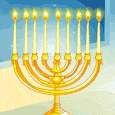
Hanukkah
and its prophetic aspects
Birgit Barandica, December 2007
(each year edited and extended a bit)
The LORD is my light and my salvation
- whom shall I fear?
Psalm 27:1
According to the Hebraic calendar, Hanukka always begins on the 25th of Kislev, which on our present Gregorian calendar is always some days before Chrismas and varies each year. Last year 2016, it began exactly on the eve of Christmas, of december 24.
The feast lasts eight days. The actual start of the feast however, is on the eve: Because according to the Hebraic-biblical calendar, all days begin on the eve: "And there was evening, and there was morning - the first day" (Genesis 1:5).
Since Hanukka always takes place in the vecinity of Christmas, it is often wrongly called "Jewish Christmas" and ignorantly, even called "Chrisnukka". Maybe one could think so because each day, one more candle is being lit. Yet here, it is not out of the anticipation known in the Advent candle counting leading up to Christmas - it doesn't have anything at all to do with Christmas. The Hebraic word Hanukka means dedication. So makes a small introduction to this feast necessary:
Historical information:
Like Purim, Hanukkah is not ordained by God in Levitucs 23, yet it still has a biblical foundation: Purim is based on the Book of Esther and how she saved her people in the Babylonian exile from a dangerous antisemite, thus managing for them to return to Israel, around 520 BC. There, they built the second Temple, after the first one had been distroyed by the Babylonians some 70 years before.
Hanukka is also biblically based, though apocryphal: it is based on the books of Maccabees and came into being in a time in which it was repeatedly attempted to distroy Israel. Also here, the Temple was the stumbling block:
Around 200 BC, the country was occupied by the Seleucids (Syro-Greeks. The empire of Alexander the Great had collapsed and was partitioned among 3 smaller empires of which one was in the Syrian territory). Antiochus III subjected its people, the Jews, and a bit later, Antiochus IV Epiphanus forcefully tried to secularize them with Greek thinking and philosophy of life. He forbid them to exercise their faith, distroyed Torah scrolls, while the observance of Shabbat, feasts and the circumcision were forbidden under penalty of death.
Would this secularization have been successful, it would have been the end of Judaism. In such a knowledge, it is a typical antisemitic demeanor which can often be seen before big hostilities against Jews. Even nowadays, while antisimitism is on the rise again, circumcision is seriously being discussed again worldwide in many places - even in my country Germany, it was forbidden under a court rule some few years ago. Right now, it is being discussed at the German parliament to redefine it legally...
Now if you go on thinking about a possible success of the secularization, then it becomes clear that Yeshua would never have been able to come here! He wouldn't have been born and Christianity would have never existed... Just a little food for thought for Christians...
But the enemy is always trying to tempt the world with his hate toward God. He takes advantage of all possible and impossible situations and even people, and as a result we have those disastrous persecutions and pogroms... Back to the Seleucids - they ordered people to worship Greek chief god Zeus in the Temple, they offered him pigs and forced the Jews to eat that meat... All of this happened in order to break the Jews morally...
This humiliation sparked the Maccabean revolt. A priest by the name of Mattathias and his sons led the revolt, with his son Judas leading the troops. Judas had the side name Maccabee, which in Aramaic means "hammer". He led several small crusades and finally conquered Jerusalem back in 165 BC. Right on that same day three years after the Temple had been desecrated, the Jews cleansed it and rededicated it. So it is about the victory of a few over many!
This is the historic background. And then it is being told that the rededication of the Temple went along with a miracle of God (which is the actual reason for the feast):
The miracle of Hanukka
In the Temple, there was the menorah - a seven-branched lampstand that had to be lit continuously, never to extinguish. It was lit with a particularly dedicated olive oil that took eight days to produce. While cleansing the Temple, the Jews found a small jar with that dedicated oil, yet it sufficed only for one day. And this is where the miracle begins:
In their attitude of "now more than ever", the Jews used this little oil anyway and - lo and behold - it lasted eight days!!! It gave the Jews the necessary opportunity to produce the specially dedicated olive oil in the usual way! And so they celebrated this Hanukka miracle together with the rededication of the Temple, thus turning it into an annually recurring feast.
At first, the celebrations took place only in the Temple. In Yochanan (John) 10:22 we read that also Yeshua celebrated this feast, going into the Temple for this reason (which proves that this feast was NOT abolished by Him!). Yet when Jerusalem and the Temple were distroyed permanently by the Romans in 70 AD, which spread the Jews into all the world where they had to live in Diaspora, Hanukka became more of a home celebration, being known in a similar way up to today.
The Light of the world...
In remembrance of this miracle, an eight-branched lampstand is being used on this feast, the so-called Hanukkiah: each day, one more light is lit, until at the end, all eight candles are lit. There is a ninth branch in the middle of all candles that does not count and stands a bit elevated. It is the so-called Shamash (servant). All other candles are to be lit only at this ninth light, after saying special brachot (blessings). So first, you light the Shamash and then, on the first evening, you put the first candle to the far right branch. On the 2nd day, you place the 2nd candle left to the first one, and so on. Yet you kindle them from left to right:
![]() Each day, one more candle is placed from right to left...
Each day, one more candle is placed from right to left... ... and lit from left to right.
... and lit from left to right.
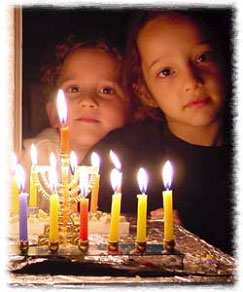 |
When the candles are lit, they are being placed in a window pointing toward the street so that people outside can see the Hanukka miracle and that there is a new beginning. It is a testimony for the Light of God, this is why this feast is also called Festival of Lights. It is not only one lit Hanukkiah, but many lights and candles. Children often have their very own little Hanukkiah. | 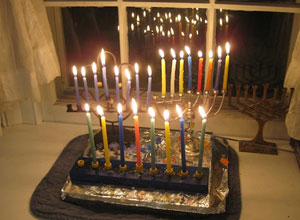 |
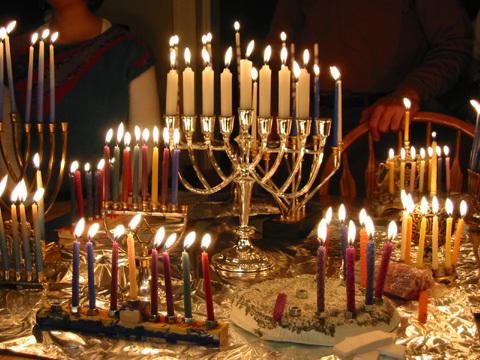
The usual seven-branched menorah, which God caused Moses to build, symbolizes the promise of the light which was to come by the Annointed One of God (see Exodus 25:31-40 and 37:17-25)...
... Yeshua HaMashiach (Jesus the Messiah)!
The Hanukkiah not only represents the light of the Annointed One, but with the eighth branch also a new beginning. And the ninth branch is the Shamash or Servant that lights the other candles. For us believers in Yeshua, it represents Yeshua Himself: "... just as the Son of Man did not come to be served, but to serve, and to give his life as a ransom for many (Matthew 20:28)!
"Arise, shine, for your light has come, and the glory of the LORD rises upon you" (Isaia 60:1).
Yet Yeshua HaMashiach (Jesus the Annointed) is not only a servant, but He Himself IS the Light that illuminates the world with the promise of a new life, the new beginning, to those who come to Him! We read the announcement for this already in Isaia 49:6, "It is too small a thing for you to be my servant to restore the tribes of Jacob and bring back those of Israel I have kept. I will also make you a light for the Gentiles, that you may bring my salvation to the ends of the earth."
In John 1:1-9, He is being annound once more, "In the beginning was the Word, and the Word was with God, and the Word was God. He was with God in the beginning. Through him all things were made; without him nothing was made that has been made. In him was life, and that life was the light of men. The light shines in the darkness, but the darkness has not understood it. There came a man who was sent from God; his name was John. He came as a witness to testify concerning that light, so that through him all men might believe. He himself was not the light; he came only as a witness to the light. The true light that gives light to every man was coming into the world."
And in John 8:12, Yeshua Himself confirms it, "When Jesus spoke again to the people, he said, I am the light of the world. Whoever follows me will never walk in darkness, but will have the light of life."
And later, in the New Jerusalem, He will be more than our spiritual light, for then we won't need lights anymore: He Himself will be our light, "The city does not need the sun or the moon to shine on it, for the glory of God gives it light, and the Lamb is its lamp" (Yeshua; Revelation 21:23)!
In the first chapter of Revelation it is particularly evident that the Menorah/Hanukkiah symbolizes Yeshua, for when Yochanan (John) wanted to know who was speaking to him, "I turned round to see the voice that was speaking to me. And when I turned I saw seven golden lampstands (menorot - plural for menorah), and among the lampstands was someone like a son of man, dressed in a robe reaching down to his feet and with a golden sash round his chest" (Revelation 1:12-13).
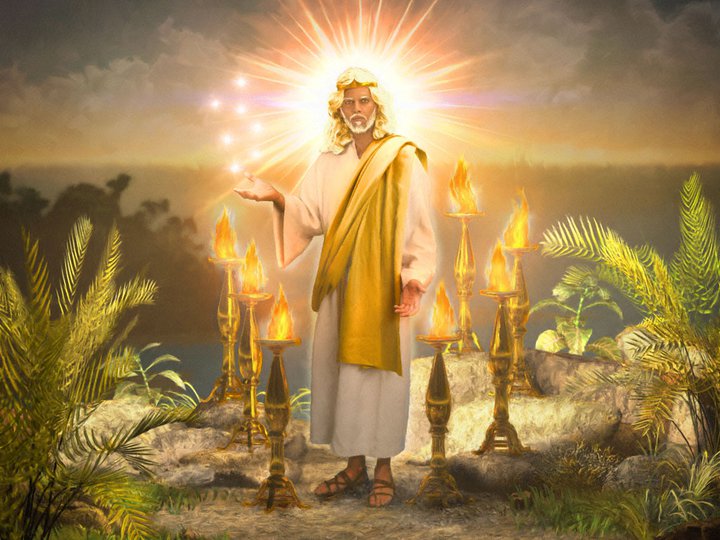
Fazit:
During Hanukka one does not only commemorate the remarkable Maccabee rovolte which, to the glory of the God of Abraham, Isaac and Jacob, ended in religious freedom - but it is about the triumph of Light over darkness, pureness over impurity.
The Hebrew word Hanukka means dedication Like the Temple was cleansed and rededicated, we believers in Yeshua should always remember that on this side of life, we too need cleansing and should rededicate ourselves everytime anew. For in the spiritual sense, we believers are a Temple of God: "Do you not know that your bodies are temples of the Holy Spirit, who is in you, whom you have received from God?" (1 Corinthians 6:19). Therefore, Hanukka is a feast that also we as Christians can indeed celebrate, and as to my opinion, even should celebrate! For, like with all feasts ordained by God, also Hanukka points toward Yeshua, our annointed Savior, even if this feast is not ordained by God! And this, to my mind, is a miracle in itself!
"Festival of Lights" by Ted Pearce
Marty Goetz
The celebration
Although the feast lasts eight days, it is not counted a complete holiday, which means one has to go to work or school. Yet each evening, after the special blessings, the candles are being kindled in a very festive way.
It is not allowed to fast on these days for Hanukka is a happy feast. People enjoy joyful fellowships with family and friends, they sing a lot, tell stories and ...
... enjoy good meals like at almost all biblical feasts: this time deep-fried bakery, in remembrance of the oil miracle!
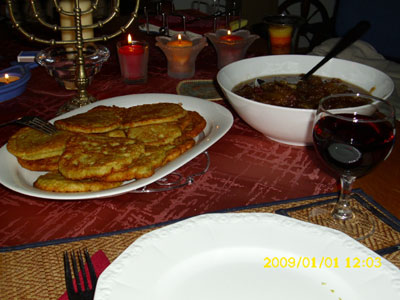 Selfmade Latkes with apple sauce ... |
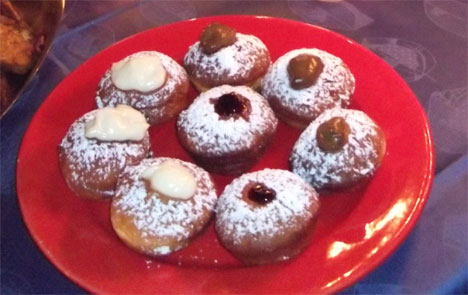 and selfmade sufganiyot with different fillings |
For example Latkes (special potato pancakes) and Sufganiyot (doughnuts). Try not to think of the calories while enjoying them at Hanukka!
Good meals are very important in Jewish life, especially at the feasts. The background is an idea based one many respective experiences: "They tried to kill us. God intervened. Let's eat!"
Tradition isn't neglected, either. In each of the eight evenings, children get gifts and so-called Hanukka gelt (a Yiddish term for money), as to an ancient tradition: During the occupation, Torah teachers were not allowed to practice their jobs. Yet parents kept sending their children secretly to Torah class and gave them money for their teachers. This is what is being remembered with the Hanukka gelt. Kids are being encouraged to donate part of this "gelt" to charity causes.
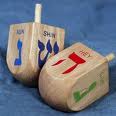 |
There is a special family game that is traditionally played at Hanukka with a Dreidel, or sevivon in Hebrew. It is a four-sided spin and is based on the lore that biblical scriptures were being studied a lot despite the Seleucid occupation. When a Greek patrol came around, the Jews quickly hid the scrolls and began playing with this harmless Dreidel. |
On each side the spin has a Hebrew letter written on - נ (nun), ג (gimel), ה (hey), ש (shin), which stand for the sentence "Nes gadol hayah sham" – "a great miracle happened there". In Israel you'll often see the letter פ (peh) written instead of "shin", which then means: "Nes gadol hayah po" - "a great miracle happened here"!
Dreidel is mostly played for sweets or special sweet game coines and the letter which after spinning shows on top tells what has been won:
נ (nun) nothing.
ה (hey) half of the pott.
ג (gimel) all of the Pott.
ש (shin) you have to give 2 coins into the pott.
~~~~~~~~~~~~~~~~~~~~~~~~~~~~~~~~~~~~~~~~~~
A newer tradition is for kids to get presents each Hanukka evening. This was being introduced, since kids had a sad peek on the Christmas presents of their Christian friends...